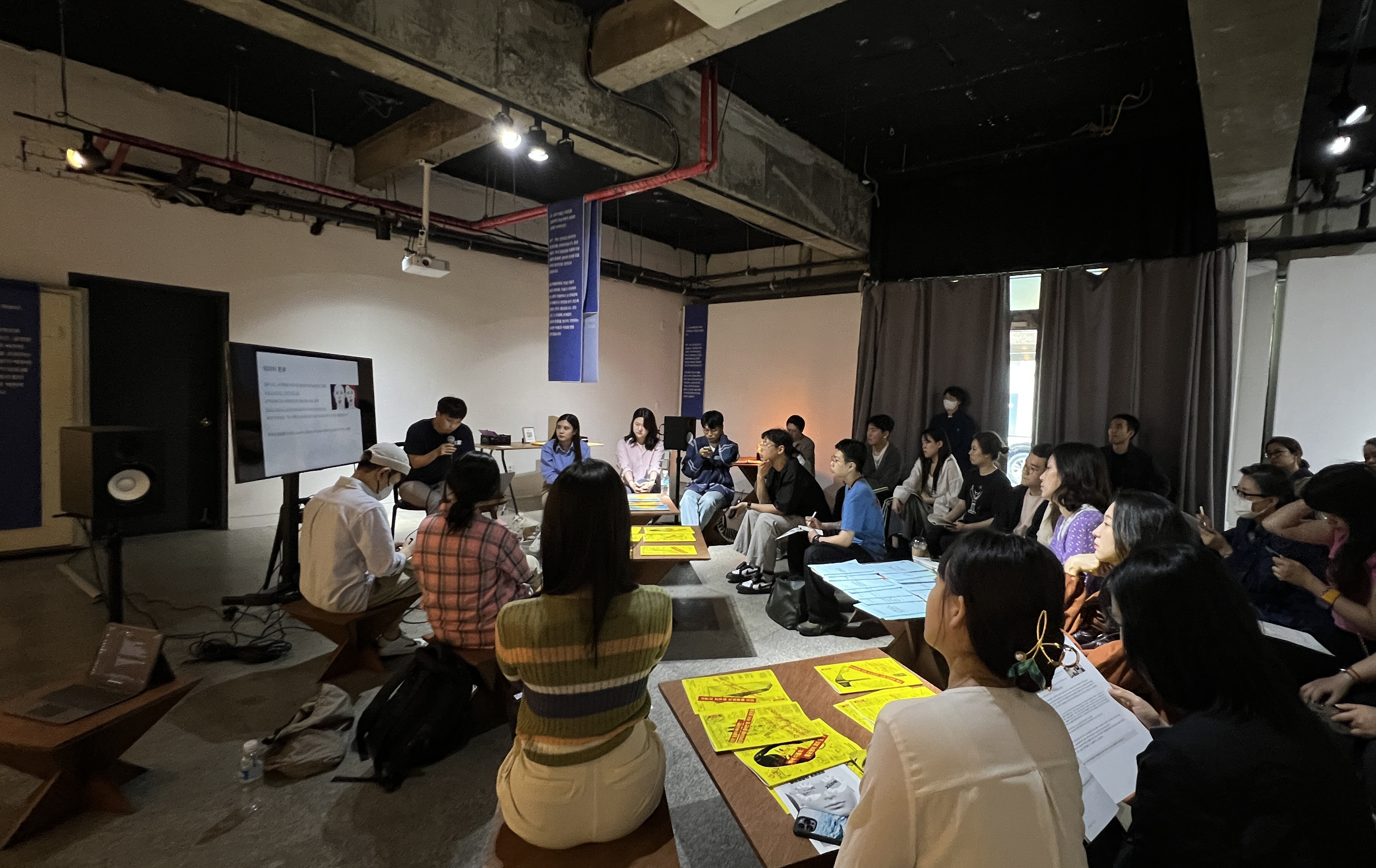About the event
Nam June Paik Art Center illuminates the activities of participating artists from various perspectives in conjunction with the exhibition On Collecting Time. In this program, we invite Unmakelab, a participating artist, to present their research lab of Forking Room 2023 Prompt Adrenaline, which was conducted in collaboration with curator Min-hyung Kang. We aim to share critical research conducted in the midst of countless rumors, cheers, and concerns surrounding prompt-based massive Generative Artificial Intelligence such as Chat GPT and DALLE-2, with five researchers and the audience.
Program
Forking, which means “pruning” in English, is also a term used in open-source culture to describe the branching process of technology. Forking Room employs this process as a framework and serves as a platform to explore phenomena, sensations, and socio-cultural significance that arise at the intersection of art, technology, and society through exhibitions, workshops, talks, and journals.
Forking Room has paid attention to giant generative artificial intelligence models such as ChatGPT and DALLE-2 this year. These AI models, triggered by prompts, are opening the era of synthetic media and generating new reality effects. Forking Room presents research that gathers senses that react agilely to prompt-based generative artificial intelligence, like adrenaline causing immediate changes in our bodies, from a critical and unique perspective
Seungbum Kim examines the current landscape of technology through the practice of a store catalog, searching for the possibilities of meta-approach within it. Koh Achim discusses the hidden realities behind the forces that drive AI technology. Narim Lee raises questions about how education is adapting these technologies. Haerin Do explores the linguistic power inherent in natural language-based AI and its potential for liberation. Seokhwa Oh delves into the operational mechanisms of these technologies, which generate results based on probabilities, in relation to issues of creativity. Finally, the panelists connect all the topics by building upon the questions posed to each other, forking the focus room into a shared knowledge production platform.
Panelists : Koh Achim, Seungbum Kim, Haerin Do, Seokhwa Oh, Narim Lee x Forking Room (Min-hyung Kang, Sooyon Song, Binna Choi)
Prompt Catalog

By Seungbum Kim
It’s like flipping through a store catalog. Store catalogs, sandwiched between newspapers, were mediums that excessively employed alluring adjectives, tempting people to buy things they didn’t even need until that very moment. Although the store catalog was an uninvited guest, it sometimes proved more captivating to read than the newspaper itself. What would happen if we were to apply the practices of store catalogs, which were occasionally more intriguing than newspapers, to contemplate a massive language model and various generative AI based on it?**
Seungbum Kim is interested in computing for/by end users and working with it. He believes that when computing becomes a part of everyday literacy, enabling individuals to think and express themselves about it, it creates new opportunities to perceive and understand the technological mediums that shape our culture and society.
Cortisol Prompt

Narim Lee
The interest and anticipation for ChatGPT surge like adrenaline. There are various stress factors, such as the demands for educational innovation, the industry shouting “faster, faster,” inherent unethicality in technology, and unanswerable dilemmas. Cortisol is a stress hormone, but when appropriately secreted, it enhances concentration and enables coping with crisis situations. Can we summon generative AI as a cortisol-like element in education?
Narim Lee is an artist and instructor living at the intersection of art, design, and technology. They have been creating works on light, life, and resistance, and are also involved in performances, research, and woodworking.
Who is trying to provoke what reality?

Koh Achim
The full commercialization of generative AI, represented by ChatGPT, reveals even the collisions of worldviews that have not been well manifested so far. We contemplate what realities those who drive artificial intelligence technology and discourse are trying to provoke, and what realities are hidden behind those discourses.
Koh Achim pursues socially meaningful and concrete actions in the field of artificial intelligence ethics, while contemplating the balancing of ambivalent sentiments towards digital technology. He is interested in the intersection of technology with Korean society and, ultimately, the global network.
Papago’s Rebellion

By Haerin Do
Prompt-based generative AIs smoothly translate machine language into natural language and transform text into images. However, in the process of generating text, language can slip, revealing or reproducing the power structures of human culture, or even concealing them. In an era where communication with artificial intelligence is creating new paradigms, how will society, institutions, and power structurally transform?
Haerin Do is interested in exploring the hidden aspects of contemporary society through the lens of art and technology. With her thesis titled “Artificial Intelligence Art Research as a Practice of Post-Colonialism and Cultural Translation,” she obtained a Master’s degree in Art Studies. She has been involved in creating media art exhibitions and writing articles for various art galleries.
Unchained Melody

Seokhwa Oh
Last August, when KakaoBrain’s artificial intelligence SIA published a poetry collection called “The Reason for Writing Poetry,” it seemed valid to question whether artificial intelligence could engage in creative work. However, in the face of the rapidly evolving ability of AI to write poetry, this question seems to have been reversed and turned towards us. From the perspective of artistic creation, what kind of relationship can we form with artificial intelligence, and should we form one?
Seokhwa Oh majored in electrical engineering in college and graduate school, and has been publishing poetry since 2020. He constantly oscillates between literature and technology, curious about where it will lead him. He sometimes posts diary on his blog and occasionally translates as well.





